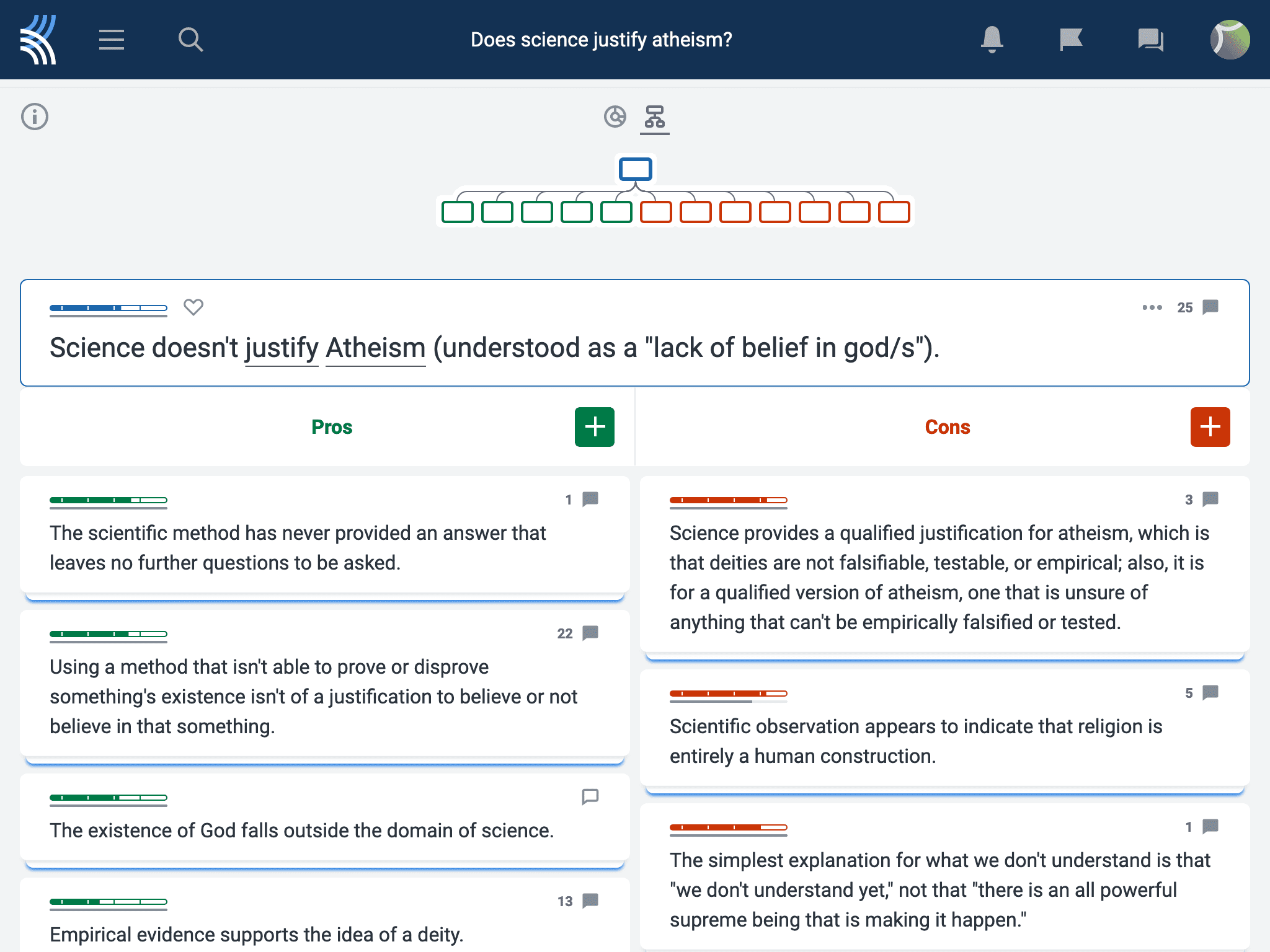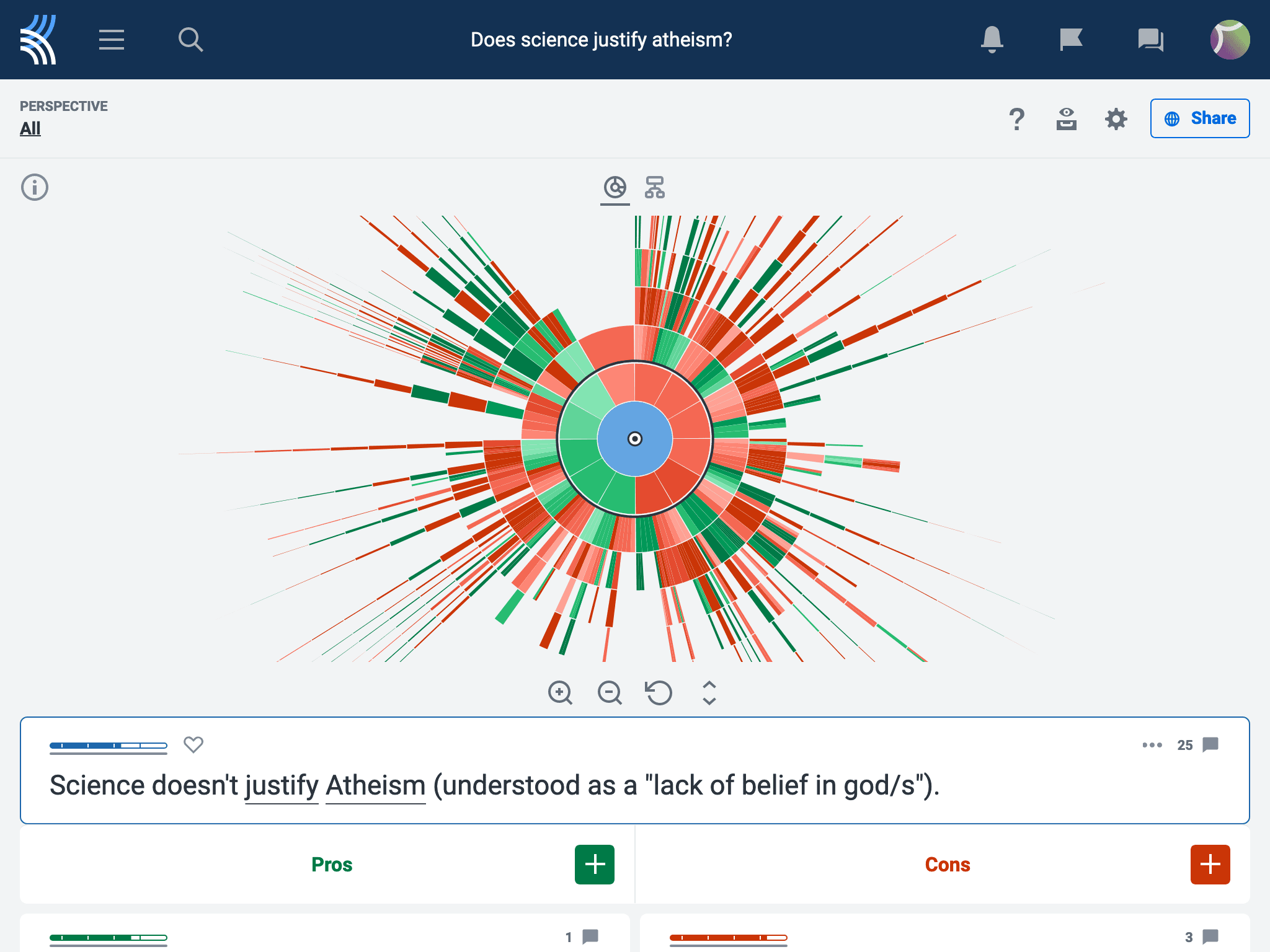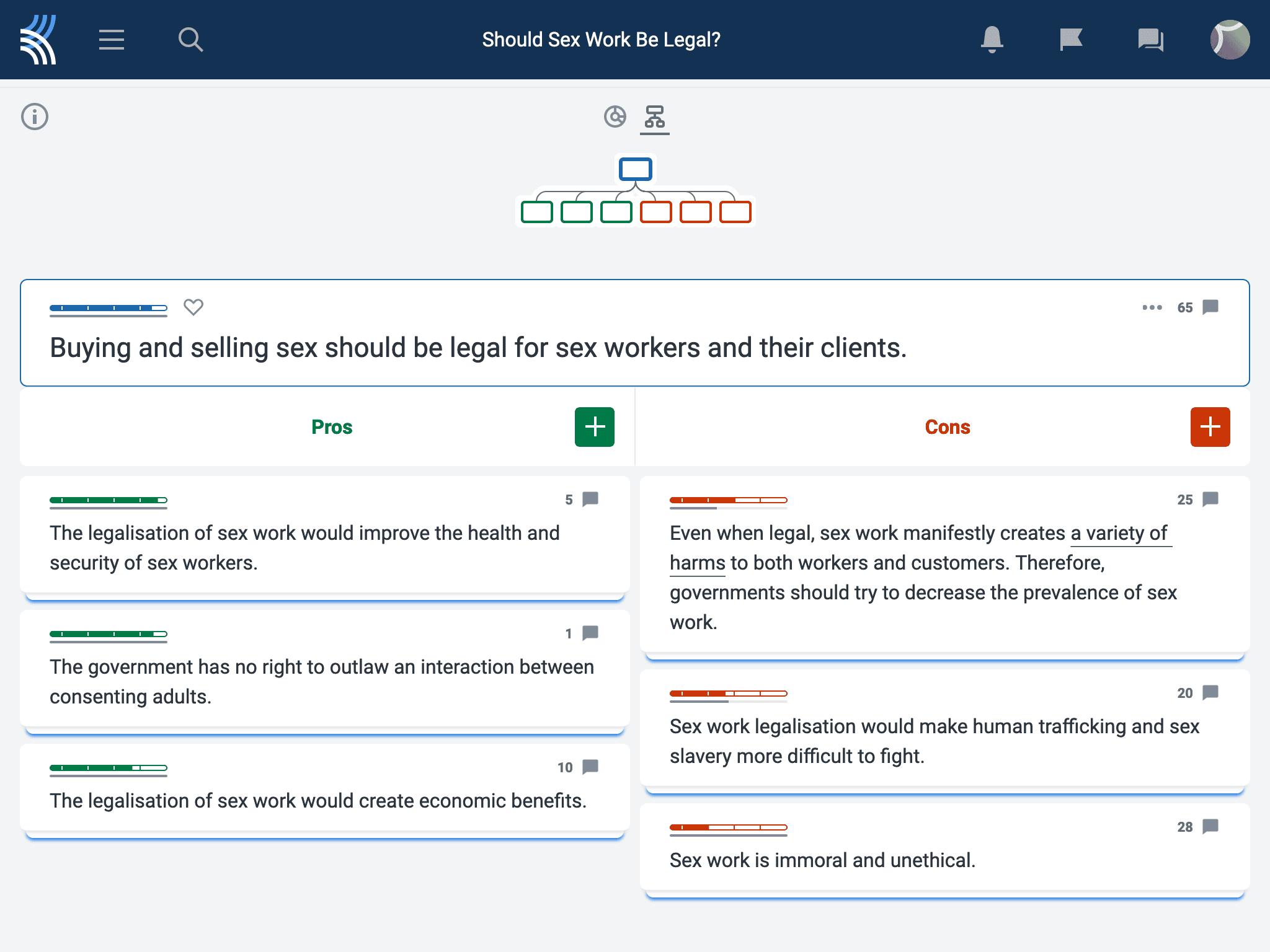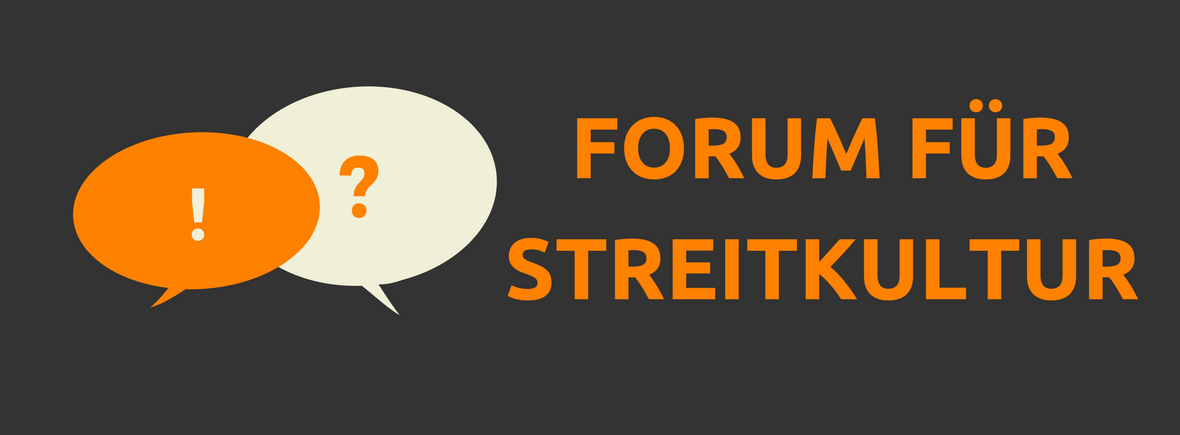Kialo is a tool to help us argue well. Argumentation serves a number of epistemic functions. When using argumentation in any of these functions, we need to be able to reliably identify, interpret, and evaluate arguments. Kialo can help by identifying claims and reasons, visualizing them in argumentations, and showing how different reasons relate to particular claims.
But to properly interpret and evaluate arguments, we need to reconstruct them. Here comes the Principle of Interpretative Charity into play. What is this principle and why is it important?
Three goals of argument — and why they are not enough
To answer this question, we need to first talk about the goals of argumentation. So, why do we argue? In many cases, people just want to emerge seemingly undefeated from an argument. It’s about the impression that one’s arguments make on the other party or third parties — for example, by taking the right side in a dispute between two groups or simply leaving the scene unscathed. This is one goal people pursue when arguing.
Secondly, and relatedly, people argue to persuade or cajole others. They want to assert their opinions or interests. Sometimes, it’s simply a matter of having the last word in the debate or of getting the best result in a negotiation, of winning the argument and getting our way regardless of the other party’s interests and convictions: People want to win the argument and get their way.
Thirdly, in some cases, we do not want to just persuade others, but also to have them actually believe something. This means that others should end up sharing our opinion and realizing that we are right. What an argument is has even been characterized with this objective in mind; it is sometimes said that an argument is essentially about convincing the other party.
These three goals are sometimes worth pursuing (at least from the respective individual perspective) — and we intuitively enter a dispute with one of them in mind even if we do not consciously set a particular goal. These goals are closely related to a central function of argumentation; namely, justifying beliefs, actions, or behaviors to those around us. Yet all too often, directly pursuing them does not lead to successful persuasion or belief change. In fact, this generally results in bad arguments.
Further goals we can achieve by argumentation — and why they are important
However, there are other goals we can effectively pursue by argumentation. That is, we can, fourth, understand the other person better through disputes because we get to know his or her position on a particular issue and learn the reasons for it. Fifth, through argumentation we can learn about a subject matter by identifying and clarifying new positions and the reasons for and against them. This can help us understand the world better even if the positions we learn about are incorrect or if the reasons given are flawed. Sixth, arguing can help increase coherence in one’s own belief system by bringing to light the inferential relations between different beliefs. We learn about reasons against our own position and have the opportunity to adjust, differentiate, and clarify our beliefs in their light.
These previous three goals in argumentation all work in culmination towards a seventh goal, which is strengthening one’s own intellectual autonomy. It is only through the reflective and systematic weighing of arguments that one’s own opinions become well-founded judgments. Only if we sufficiently understand other people, the world, and ourselves and can give reasons for our convictions, can we emancipate ourselves intellectually.
From these four directly epistemic goals arise three further goals, which are of a more practical nature. With the eighth goal, argument can help to reach a consensus or at least a compromise in a conflict. Without argumentation, this decision would have to be fought out non-verbally and non-rationally. When we learn the other party’s interests and opinions, as well as his or her reasons for them, we are more likely to find a solution that is acceptable to or even endorsed by all.
Ninth, even in cases where neither consensus nor compromise is found, argument can help improve decisions because we know better about others and the issue at hand. If done properly, by virtue of its epistemic functions, argument will ultimately improve decisions so that they have positive consequences for the majority of those involved.
Tenth, finally, argument can help legitimize a decision, even if it neither is objectively good nor agreed upon. By articulating opinions, interests, and reasons, argument allows all affected parties to make their voices heard.
Of course, there are many other goals that people pursue through argumentation — some of which are more and some are less worth pursuing. Now, the quality of an argument depends on choosing a goal appropriate to the situation. People adopt attitudes depending on their conscious or unconscious goals. If they are pursuing one of the first three goals (victory, persuasion, or belief change), they tend to adopt a fight-flight attitude that makes constructive argument pretty difficult.
But if we aim for one (or more) of the seven (directly or indirectly) epistemic goals, we need to employ arguments that are not only subjectively compelling but arguments that are good by rational standards that everyone can agree upon. And by aiming for these goals, we are already more likely to create good arguments. Still, we need a way to interpret them to properly evaluate them — something which we can use Kialo to help us do, at least if we actively use the Principle of Interpretative Charity.
Why arguments need to be reconstructed with the Principle of Interpretative Charity
A basic challenge when encountering arguments is that they need to be interpreted first. This is so because arguments, as we encounter them in everyday life and also on Kialo, are incomplete and the statements that make up the arguments are under-determined. Arguments are incomplete if they contain implicit premises that speakers are committed to, but do not explicitly state. Statements are under-determined if they can reasonably be interpreted in multiple ways due to ambiguity, vagueness, or other forms of indeterminacy.
That is why we always need to employ the Principle of Interpretative Charity when evaluating arguments: We should always interpret the statements and arguments of others — within the boundaries of wording and context — as rationally as possible. Practiced reliance on this principle is the foundation of constructive argument. It presupposes that people listen to each other and take the claims and arguments of their counterparts seriously.
Interpretative Charity does not necessarily entail acceptance of everything others say. It does not entail that one has to be overly polite or that one has to get rid of one’s emotions. Strong critique of arguments and the expression of emotions is perfectly compatible with striving for objectivity and employment of the Interpretative Principle of Charity. The most important thing is a maintained focus on what is said — on the content matter, that is, and the arguments made.
What goes into making a good argument — and how Kialo helps with that
An argument is a set of statements, some of which (the premises) are intended to support another (the conclusion). The quality of an argument depends on how well the premises support the conclusion and how relevant the conclusion is to the question at hand. How well the premises support the conclusion depends on the truth of the premises, but also — crucially — on the validity of the inference between premises and conclusion.
Luckily, inferences between statements can be clarified by argument maps. Argument mapping is a great tool for achieving the epistemic goals of arguing. There are many argument mapping tools that are more or less suited for particular sub-goals — such as differentiating between conclusions and premises or explicating logical inferences.
Using Kialo’s argument-mapping structure to identify and sort arguments
Kialo, for instance, is great at visualizing reason hierarchies. In this type of visualization, one can represent reasons that are not directly for or against a claim, but rather indirectly supporting or attacking it. On Kialo, reason hierarchies are represented as tree and sunburst diagrams. They are a clear improvement to pro-con lists that many people solely rely on when analyzing argumentation. While they are a good starting point (as the pro-con list in Example 1), they in no way capture the argumentative structure of an argumentation.

To interpret and evaluate the arguments properly, we need to sort reasons into 1) those that directly support or attack a claim and 2) those that support or attack another reason (and thus only indirectly support or attack the main claim). Here Kialo comes in and helps explicate this structure (see Example 2).

But there are also limitations even to reason hierarchies. Evaluating the overall plausibility of a claim requires understanding the underlying reasons behind them and reconstructing them as arguments (with premises and conclusions). Argument reconstruction, in turn, requires the interpretation of the individual statements from which the arguments are formed, which can only be achieved by applying the Principle of Interpretative Charity.
When using pro-con lists and reason hierarchies, the reasons listed often presuppose different understandings of the central claim. Reasons are put forward that are not strictly reasons for and against one claim, but for and against multiple more or less similar claims.
For instance, how should we understand the expressions “science”, “justify” or “god” in the main statement of Example 1? (Interestingly, the expression “atheism” had already been clarified at some point of the discussion.) But even if the claims are phrased more precisely (as for instance in Example 3), there are usually lots of different ways to understand them – and these different ways are reflected in the reasons given — as they are formulated on Kialo.
Why properly evaluating arguments needs to go beyond Kialo
To properly evaluate arguments, we need to better differentiate claims. That is, we need to take a closer look at the syntax, semantics, and pragmatics of language. And the best way to do this is to attempt to reconstruct the reasons as complete arguments. This, however, involves interpretation — and interpretation has never just one possible outcome. There are always some divergent interpretations that are plausible, even if many others are clearly implausible.

For instance, we can reconstruct the first reason for the claim in Example 3 in the following way:
- Premise 1: Sex work legalization would improve the health and security of sex workers.
- Premise 2: If sex work legalization would improve the health and security of sex workers, then buying and selling sex should be legal for sex workers and their clients.
- Conclusion: Buying and selling sex should be legal for sex workers and their clients.
Now, we have a valid argument with a conclusion that is identical to the main claim and thus relevant. However, the premises are not very plausible. Premise 1 is, of course, questionable. First, it needs to be clarified what it would mean that the health and security of sex workers is improved. Also, it needs to be empirically established. That is, we need further arguments that support Premise 1. Here, Kialo is quite helpful because it can help bring these arguments to our attention by visualizing them as further pro reasons to the reason hierarchy.
What is even more questionable is Premise 2, however. Clearly, if sex work legalization would have other highly negative consequences or if sex work were inherently immoral (as the third con-reason suggests), we should not legalize sex work, even if it would improve the health and security of sex workers. Thus, we need to adjust the reconstruction of the argument — for instance in the following way:
- Premise 1: Sex work legalization would improve the health and security of sex workers.
- Premise 2: If sex work legalization would improve the health and security of sex workers if it does not have negative consequences that outweigh the health and security improvement and if sex work is not inherently immoral, then buying and selling sex should be legal for sex workers and their clients.
- Premise 3: Sex work legalization does not have negative consequences that outweigh the health and security improvement.
- Premise 4: Sex work is not inherently immoral.
- Conclusion: Buying and selling sex should be legal for sex workers and their clients.
This is, of course, not the end of the necessary adjustments to properly interpret and then evaluate the argument. We would still need to consider the other reasons given and modify (step-by-step) the premises and perhaps even the central claim. For the task of argument reconstruction, Kialo is somewhat less well-suited because it does not distinguish between different premises within an argument. And this is also why the exact support or attack relation between different pro and con reasons will often be left unclear. But if it remains unclear how (well) the different reasons support or attack a claim, we cannot reasonably evaluate it.
Tools such as Kialo are very handy in identifying reasons and (tentatively) sorting them. Based on this, we can constructively argue about the central claim by weighing the reasons that speak for and against it. Doing this properly, however, requires one to reconstruct reasons as arguments — which in turn requires employing the Principle of Interpretative Charity along with practiced argumentation skills.
This essay was originally published on the Kialo blog:




